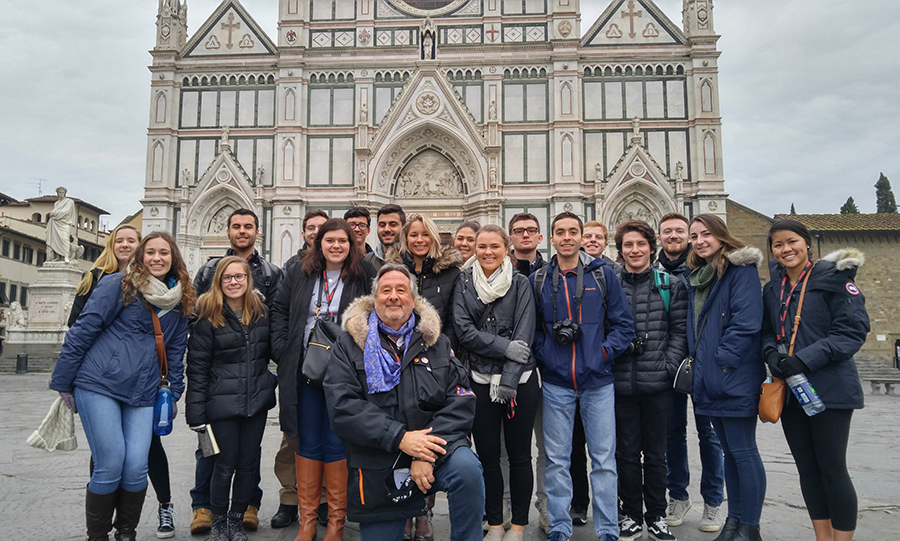On This Page
Studying Abroad
We encourage your son or daughter to consider the many choices Fairfield offers to spend a semester, year, month, or just a week abroad earning academic credit and gaining the kind of knowledge only an onsite experience can provide. Fairfield’s programs offer exceptional learning opportunities beyond the classroom including internships, volunteer work, academic excursions, service-learning, and events that make the experience enjoyable and meaningful.
Fairfield University students must select their study abroad program from the list of approved programs. The approved list includes over 60 different study abroad programs on six continents. With proper planning, all majors and minors may study abroad. The approved list is composed of Fairfield-administered programs, exchange programs, and affiliated programs offered by other universities and study abroad organizations.
Please review the Fairfield University Policies and Procedures above. Information regarding admissions policies, program cost, withdrawal and program cancellation, code of conduct, health and safety abroad, disability support, FERPA and housing can be found in this section.
Watch our Parent/Guardian Webinar "What Parents Should Know about Studying Abroad with Fairfield University" to learn more about the study abroad programs at Fairfield.
Your Student Living Abroad
As your student prepares to leave, offer them your support, help with packing, and let them know you can be reached from overseas when needed. When they first arrive they will often go through a honeymoon period and be excited to finally be in their new setting. Later, facing the realities of living abroad (such as unfamiliar customs, food, language, housing, transportation, and new university procedures) culture shock may set in. It is common for students to go through some ups and downs during their stay. As your son or daughter learns to problem solve and adapt they will soon rise to a new level of independence.
As parents, it is difficult to not try to solve problems for your student. Try to avoid becoming too involved in finding solutions for them – but rather be a good listener as they learn to process what they are going though while abroad. This is all part of the learning experience when studying abroad. Your student may need your support and encouragement to take the first step to talk to someone. As often as possible, encourage them to speak to the local program staff first as these individuals are in place to help your students with their needs. The local university staff and the staff of the Global Fairfield office are also available to help at any time.
If you plan to visit, please do not schedule the visit while classes are in session, on a weekend they are attending a mandatory excursion or event or during mid-terms. Your student has mandatory attendance and absences can result in a lower grade or financial penalty. It is best to plan travel after midterms, during a vacation break, or at the end of the program. Students must always plan to stay during the entire final exam period before flying home.
Please be aware that your student will come home changed from their experience. Be prepared for your student to experience some degree of readjustment to things that were once familiar. This is known as reverse culture shock. Your support, interest, and understanding will help them during the readjustment period. When college students think back about their time as a student, most feel that the time they spent abroad was the best part of their college years. By allowing your student to study abroad, you have given them a life changing experience.
Application Deadlines
All students who wish to study abroad for a summer session, semester or year must submit an online application (including an application fee) through the Fairfield University study abroad website for their desired study abroad program. Application deadlines are as follows:
Students interested in a Faculty Led January program or spring break program should review the program details online to confirm the deadlines as these dates vary by program.
All Fairfield University students are required to attend an information session in order to apply to study abroad. Students should visit the Life@Fairfield page for details.
Financing
Semester
Students who study abroad through Fairfield University for a semester on an approved program are charged regular Fairfield tuition. Housing and meal charges will vary by location. All Fairfield scholarships and aid, including federal funds, can be used towards study abroad expenses for one semester with the exceptions of athletic scholarships, tuition remission, FACHEX, tuition exchange and work-study monies. With the approval of the Associate Vice Provost for Global Strategy, students with Modern Language, International Business, and International Studies majors may use Fairfield University financial aid for two semesters abroad on select programs.
Students who study abroad on a semester/year program are required to submit a $1,000 deposit to Fairfield University. This deposit is part of the total tuition cost. The deposits are due on the following dates:
Fall, Spring and Year Programs — March 1
Summer
Students who study abroad during the summer must have their full payment paid by March 1.
Fees and billing for short term programs vary. Please visit the program specific website for information. Students who wish to use financial aid during the summer are encouraged to connect with the Fairfield University Office of Financial Aid to explore the possibility of having their financial aid package readjusted to include their summer abroad.
Faculty-Led Programs
Students who participate in a faculty-led program can find financing information directly on the programs brochure page. Students who wish to use financial aid for a faculty led program are encouraged to connect with the Fairfield University Office of Financial Aid to explore the possibility of having their financial aid package readjusted to include costs associated with the program.
General Information
Program Specific Information and StudioAbroad
Students have access to Program information regarding housing, airport pick-up, visa requirements, program dates, academics, etc. in their StudioAbroad account. We highly encourage all parents to sit down with their student to review this specific information. Many students provide access to their StudioAbroad accounts to their parents.
Acceptance Meetings and Pre-Departure Orientation
Students are required to attend an acceptance meeting and a pre-departure orientation. This allows the students to meet other participants in the program and learn about the next steps and deadlines. For fall students, the acceptance meetings are held in early/mid-March and pre-departure is held in April or May. For spring students, the acceptance meetings are held in September and pre-departure is held in November.
Academics
To ensure credit from a semester abroad, students are required to have their courses approved in StudioAbroad. Students are required to enroll in an academic course of study that engages them for a minimum of four days per week and may only take those courses at their hosting institution or program abroad. This process is discussed at the acceptance meeting noted above and can also be found in StudioAbroad. Students who participate in Fairfield University administered programs will receive Fairfield University credit and letter grades. Students who participate in approved non-Fairfield University administered programs will receive transfer credit if they receive a letter grade of a C or higher. Many universities abroad have different classroom structures than those found at Fairfield University. Students are encouraged to meet with their overseas advisor should they have any difficulty or need assistance. Transcripts from the semester abroad will take 8 – 10 weeks after the program end date to be sent to Fairfield, processed and uploaded into StudioAbroad as well as the students’ degree evaluation. More information about academics, and academic grievances can be found in the policies section.
In Case Of Emergency
Your first point of contact while your student is abroad is Fairfield University’s Office of Study Abroad. During the semester, our office is open Monday – Friday 8:30 a.m. – 4:30 p.m. During the summer, our office is open Monday – Thursday 8 a.m. – 4:30 p.m. and Friday from 8 a.m. – Noon. Our phone number is 203-254-4332. Outside of office hours or during holidays, Public Safety is the point of contact. Public Safety’s phone number is 203-254-4090.
The students’ first point of contact while abroad in case of emergency is the on-site coordinator. Upon arrival, students will receive the coordinator’s contact information. Though your student may reach out to you first, please encourage your student to immediately contact his/her on-site coordinator.
Fairfield University provides all students studying abroad with international medical and emergency insurance coverage for the dates of their study abroad program. Federal law requires all students to maintain domestic year-round coverage in the U.S. even while the student is studying abroad. This means, students should remain enrolled on the policy of their parent or guardian, or in Gallagher Student Health Insurance through Fairfield while on their program abroad. Details regarding your international insurance can be found in StudioAbroad.
You will be automatically enrolled in CISI Health Insurance from the start date to the end date of your study abroad program. This insurance program is included in the program fee, and there is no additional cost. This coverage does not replace your primary insurance but does provide extensive medical and emergency coverage. Please watch this video to learn about the full range of services that you will receive from your CISI coverage.
Click here to view detailed documents with all the information regarding your Fairfield University coverage with CISI.
- If you currently take prescription medication and will need this medication during your semester abroad, it is important you contact CISI directly to discuss your needs and options. You need to ask (1) is my medicine legal in the country in which I am studying and in the locations to which I plan on traveling (2) am I legally allowed to bring xxx month(s) of medication with me or am I able to fill my prescription abroad. Depending on the answers to these questions CISI may advise you to contact your primary care physician to discuss your options.
- The Americans with Disabilities Act and Section 504 of the Rehabilitation Act do not apply to foreign institutions. Though many of our partners will do their best to accommodate for student’s needs, please know that there are times when accommodations cannot always be made.
- We invite all students to self-disclose to Global Fairfield. Once you have received your documentation from the Accessibility Office in campus, please forward the documentation to the relevant Study Abroad Advisor.
- If you seek counseling while at Fairfield and wish to continue those services while abroad, there is substantial support available to you through CISI and with our location health resources. We are happy to review resources with you and help connect you directly to CISI to see what services best meet your needs.
- Students who do not self-disclose put themselves at a disadvantage. With advanced planning, Fairfield University can assist the student with the communication necessary with all parties involved in order to ensure support while abroad.
Risk Management
Though a collaborative service with CISI, Fairfield University provides all participants with travel safety resources like the myCISI APP, Emergency Check In feature, and Weekly Travel Log. These services are our way of ensuring your travel safety. For purposes of Risk Management, and to ensure your optimal safety during your program, Fairfield University requires that all travel done independently from the program be registered with CISI using the Weekly Travel Log Itinerary. You will register your independent travel, meaning any time you are spending time outside of your host city, through CISI every Thursday indicating your location Friday - Sunday by logging into your CISI account. Students will receive instructions on how to Access to the CISI APP and online account upon receiving their insurance card.
If you are traveling before and/or after the program dates and would like to purchase CISI insurance for this period of your trip please see page 6 of the CISI Participant Guide found below (Purchase Individual Coverage) for information.
All students and their families are encouraged to review the CISI Participant guide to learn more about the CISI portal and the services they provide. myCISI Participant Guide.pdf
If you have additional questions regarding this matter, please feel free to contact our office -globalfairfield@fairfield.edu
Travel Insurance
If you have any concerns about the financial impact if your program abroad will be canceled prior to departure or while abroad, you can enroll in Cancel for any Reason (CFAR) or Interrupt for any Reason (IFAR) travel insurance. These plans can help protect your prepaid costs if you are forced to cancel or interrupt your travel for any reason Pre-paid costs might include a VISA application fee, books, supplies, travel arrangements or activities while in country, or airfare to your study abroad location.
Through our partnership with Cultural Insurance Services International, we have identified World Trip Protector Plans offered by Travel Insured International as a provider with options that may be of benefit for you. To learn more about these travel protection plans or request a quote, please visit https://www.culturalinsurance.com/academic-trip-protector-insurance-program.asp
Fairfield University does not endorse any specific carrier and purchase of CFAR insurance is not required but Global Fairfield strongly encourages students and their families to research travel protection options and consider purchasing a plan in order to limit the financial impact should you need to cancel your program abroad.
Students are required to travel with a credit card and are advised to travel with a debit card as well. Fairfield University has implemented this policy to ensure your students safety. In case of emergency, especially during independent travel, a student has the ability to quickly and easily remove themselves from the situation without worrying how much money is in their debit account. Visa and MasterCard credit cards are recommended as they are more widely accepted than American Express or Discover.
Fairfield University does not recommend one bank over another. Before going abroad, we encourage students to research their home bank’s rates concerning international withdrawals, and make sure that the bank is aware of their date of departure. Students should also inform their bank before every international trip to ensure the credit card is not denied. Be sure your student sets up online banking before going abroad, and checks their account frequently. Inadvertently, some students find themselves overdrawing their account due to forgetting to factor in the exchange rate and fees. Students are not advised to open a bank account overseas.
Fairfield University requires that all students have a working cell phone with data plan while abroad. Students must have a working cell phone at all times in case of an emergency – using a cell phone over WiFi only is prohibited. Students are encouraged to research their American phone’s international plan. Alternatively, students may choose to purchase a SIM card upon arrival in their host country. Students’ international phone numbers must be uploaded to StudioAbroad within three days of arrival in country.
Students should consider having a medical power of attorney prior to studying abroad. A medical power of attorney allows a student to assign an individual to speak on their behalf in the event the student is not able to make decisions for themselves. Students should consider connecting with a family lawyer to move forward with this process.
Students should consider having a legal power of attorney prior to studying abroad. A legal power of attorney allows a student to assign an individual to make decisions on their behalf while they are abroad, specifically with regards to their finances. Students should consider connecting with a family lawyer to move forward with this process.
The Family Rights and Privacy Act of 1974 (FERPA) provides for the confidentiality of student educational records at Fairfield University. Fairfield University may not disclose information in a student’s educational records to anyone without the permission of the student, unless disclosure is permitted by an exception set forth in FERPA, 20 U.S.C.A., Sec. 1232 et seq.
Following approval of your students’ study abroad application, your student will be given the option to complete a FERPA Release Form or to withhold that permission. By completing the form, the student is granting permission to Fairfield University officials to disclose and/or discuss the information authorized by the student on their FERPA Release form. Students are not required to submit a FERPA form; it is the student's discretion to decide whether or not they want to provide Fairfield University with this information.
For students who elect not to complete the FERPA Release Form, Fairfield University and the Office of Study Abroad will be unable to relay certain information to parents or guardians. In cases of emergency abroad, including hospitalization and student status during national emergencies, Federal law does allow Fairfield University and the Office of Study Abroad to release necessary information to parents or guardians.
The Family Rights and Privacy Act of 1974 (FERPA) provides for the confidentiality of student educational records at Fairfield University. Fairfield University may not disclose information in a student’s educational records to anyone without the permission of the student, unless disclosure is permitted by an exception set forth in FERPA, 20 U.S.C.A., Sec. 1232 et seq.
Following approval of your students’ study abroad application, your student will be given the option to complete a FERPA Release Form or to withhold that permission. By completing the form, the student is granting permission to Fairfield University officials to disclose and/or discuss the information authorized by the student on their FERPA Release form. Students are not required to submit a FERPA form; it is the student's discretion to decide whether or not they want to provide Fairfield University with this information.
For students who elect not to complete the FERPA Release Form, Fairfield University and the Office of Study Abroad will be unable to relay certain information to parents or guardians. In cases of emergency abroad, including hospitalization and student status during national emergencies, Federal law does allow Fairfield University and the Office of Study Abroad to release necessary information to parents or guardians.
As a reminder, all FERPA forms must be completed by the students online following their approval to study abroad. A sample FERPA form can be found here (PDF).
Questions regarding FERPA and the procedures followed by Fairfield University to comply with FERPA may be referred to the Office of the Dean of Students. Information about FERPA can be found online at www.ed.gov/offices/OM/fpco.
As part of the International Travel Policy, Fairfield University requires all students book their round trip flights to and from a U.S. airport through the University's designated travel agency. After program acceptance student will receive detailed information on round-trip airfare and next steps.
Why can't I book my own round-trip flight to arrive at my study abroad destination?
Students will be advised on which travel agency they will need to book the pre-approved group or suggested itinerary flights to and from their study destination. This allows Global Fairfield to connect with the agency in a time of an emergency to serve our students to safely return them home.
Once the student is accepted to the study abroad program, they must start arranging their round-trip flight travel to/from the destination. As part of the International Travel Policy, Fairfield University requires all students book their round trip flights through the university's designated travel agency.
Fairfield University Approved Travel Provider
- As part of the Fairfield University International Travel Policy, all students are required to book their round-trip flights from an U.S. airport through the University's designated travel agency. After program acceptance student will receive detailed information on round-trip airfare and next steps.
- The University's designated travel agency is able to ensure that students are provided with low cost tickets that also include risk management assurances such as changeability, emergency support and program specific bookings that gets you to your program on time.
- All students participating in a Global Fairfield program, must fly from a U.S. Airport into the designated study abroad program airport, on the designated program start date and within the specified arrival times. For Faculty Led and Provider Programs students are required to follow the flight requirements of that program.
- Fairfield University is not responsible for changes made by the airline or for the agency's refund policies. Students should not plan personal or family travel prior to the program start. Early or late arrivals are not approved. There are no exceptions to this policy.
The full "Booking Your Flights" policy can be found here.
Payment Terms and Conditions
Students will pay airfare directly to the approved travel partner. Payment terms and conditions apply. Different airlines may have different terms and conditions. Fairfield University is not responsible for airline or travel agency charges or refund policies.
Returning To Fairfield
Transcripts
Transcripts from the semester abroad will take 8 – 10 weeks after the program end date to be sent to Fairfield, processed and uploaded into the students’ degree evaluation.
Housing
Students will be contacted by Residence Life while abroad to inquire if they require housing for the following semester. Residence Life will do their best to honor all room and roommate request. For questions regarding housing on campus following the students’ semester abroad, please contact Residence Life at extension 4215.
Course Registration
Students will register for the following semester while abroad. They are expected to know what courses they need to take prior to departure for their semester abroad. Students will need to take into consideration the time zone difference when registering. For questions regarding registration, students are advised to speak with their academic advisor or the Registrar’s Office.
Booking Flights & Travel Tips
Arrival and Departure
The program dates of arrival and departure may be found in the students’ StudioAbroad account. Please note the date of arrival is defined as the date students must arrive in country - not the day a student should depart the United States. The deadline for purchasing flights may also be found in StudioAbroad.
The approved arrival window is posted in StudioAbroad. Students who arrive prior to the arrival date will not be picked up at the airport or have their accommodations available. No students may arrive later than the posted arrival date. Fairfield University and our designated travel partner will arrange all flight options for each program.
Booking Flights
Once the student is accepted to the study abroad program, they must start arranging their flight travel to the destination. As part of the International Travel Policy, Fairfield University requires all students book their round trip flights through the university's designated travel agency.
Fairfield University Approved Travel Provider
To facilitate full compliance with the International Travel Policy, Fairfield has partnered with ScholarTrip, a travel agency that provides students with airfare tickets that include risk management assurances such as changeability and refundability, emergency support, and program-specific bookings.
By having all students use the approved travel provider when booking round trip flights to their program destination, Global Fairfield is able to work with that provider in a time of emergency to affect expedited ticket changes for individuals or entire programs.
Students are given detailed information about booking their flights with ScholarTrip during First Steps Presentations, Next Steps Presentations, and through their study abroad application requirements.
For all Fairfield Center, Select, Approved Partner and Exchange programs, students must fly into the designated airport, on the designated program start date and within the specified arrival times. For Faculty Led and Provider Programs students are required to follow the flight requirements of that program. Fairfield University is not responsible for changes made by the airline or for the agency's refund policies. Students should not plan personal or family travel prior to the start of the program with the expectation of arriving by other means, at alternate dates/time, or with guests. Early or late arrivals are not approved. There are no exceptions to this policy.
Payment Terms and Conditions
Students will pay Fairfield University a Study Abroad Airfare Fee. This will allow the student to proceed to booking their flight with the travel partner. Any fees above the aforementioned fee will be charged directly to the student when booking the flight with the travel partner. Different airlines may have different terms and conditions. Fairfield University is not responsible for airline or travel agency charges or refund policies.
Why can't I book my own round-trip flight to arrive at my study abroad destination?
In accordance with the University International Travel Policy, all students must purchase their airfare from the University approved travel agency. Students will need to book the pre-approved group or suggested itinerary flights to and from their study destination. This allows Global Fairfield to connect with the agency in a time of an emergency to serve our students and to safely return them home.
Fairfield University has an International Travel Policy that all staff, faculty, and students must adhere to. The International Travel Policy is a risk-management policy intended to support the health, safety, and welfare of Fairfield University staff, faculty, and students and is intended to facilitate a comprehensive health, safety, and risk-management review of Fairfield University sponsored international travel.
As part of the International Travel Policy, students are required to purchase round trip, changeable/ refundable tickets. Students must depart from their home country to their designated program airport, and then depart from their designated program airport back to their home country.
Packing Tips
This list is not 100% inclusive; however, below you will find packing suggestions from former students. A good tip to follow while packing: Do NOT pack more than you can carry by yourself for at least two blocks.
A little bit of research will go a long way. Students should research what the weather will be like where they will be studying, so they can plan ahead and save themselves the hassle and expense of needing to purchase more appropriate clothing after arrival.
Students should ask themselves: How will climate and weather affect my activities? Will I need to bring an umbrella, swimsuit, or both?
Students who have studied abroad suggest packing certain items in a carry-on, and putting other items in checked baggage. Below are a few recommendations of what to pack where, what to leave behind, and what to buy abroad.
A note about carry-on items: Most commercial airlines now have new regulations regarding what you can and cannot pack in your carry-on luggage. Sharp items like razors and nail files are banned in carry-on luggage on most flights. In general, there are some very important items students will NOT want to pack in a checked baggage; rather, students will want to have them handy at all times and packed in a carry-on bag. These items are:
- Passport
- Visa
- Tickets
- Prescription medicine
- Glasses
- Any other official documentation
- Credit cards, debit cards and cash
Students may also want to have a few personal items in a carry-on in order to make the trip more comfortable and enjoyable. Consider including items like an empty water bottle (to be filled after passing through security), a book, a toothbrush/toothpaste and a change of clothes and underwear in case of flight delay/cancellation.
Packing takes planning, and students will most likely pack and re-pack a number of times before they are satisfied. We suggest beginning this process early.
Packing can be a very personal process and it may be especially challenging if students plan to study abroad for a semester or year. Students may want to have as many comforts abroad as they have at home, yet they know they cannot bring everything with them. However, we like to remind our students that part of the reason they are going abroad to step out of their comfort zone. Therefore, they will have to prepare to make do with fewer things.
Not only do airlines have a baggage limit, but students will have a limited amount of space at their residence abroad. Most students acquire items while traveling, including souvenirs, clothes, gifts, etc. For this reason, we suggest leaving room in their luggage to accommodate these new belongings for their flight home.
The following is a list of items students may not have thought to take with them abroad:
- Proof of Insurance
- Camera/Journal
- Prescriptions for the duration of the semester
- Dress set of clothes (for internships or formal occasions)
- A small gift for the host family (if applicable)
- Identification tags with the students’ contact information, attached both outside and inside the checked bag and carry-on bag
- Multi-county converter
Students can buy many inexpensive items when they arrive at their destination. Students should consider buying items such as textbooks, shampoo, soap, and an umbrella upon arrival.
Students should not bring any sentimental items that cannot be replaced. For example, leave heirloom jewelry at home. Additionally, any appliances that generate heat (blow dryer, straightener, heated blanket) should be left at home. Even with the right converter, they will most likely fry out, or burn hair.






